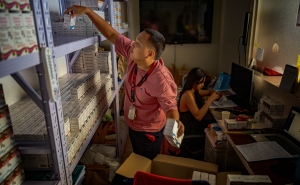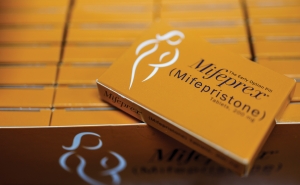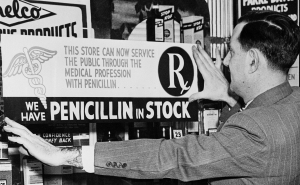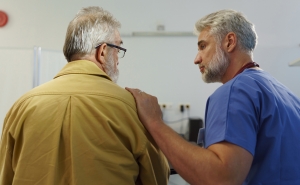It’s Time to Stop Procrastinating on Drug Disposal
Preventing opioid diversion starts with seeking local disposal resources.
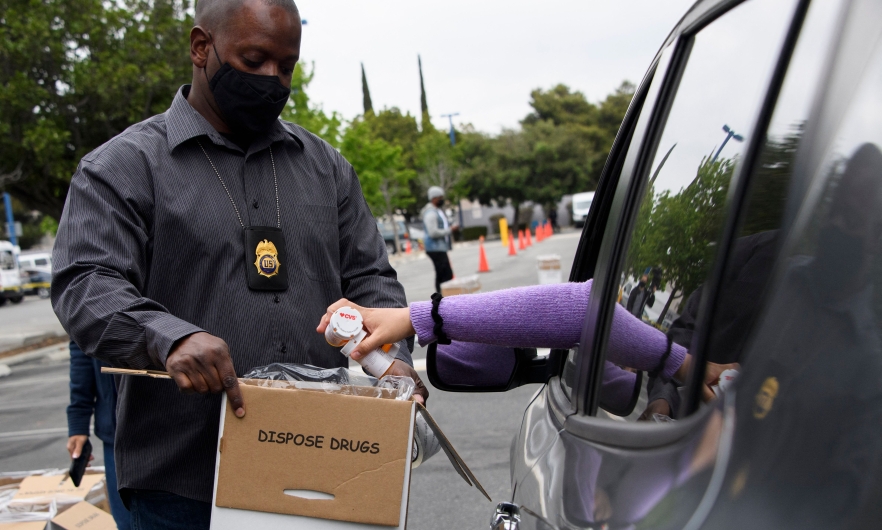
Photo by Patrick T. Fallon/AFP via Getty Images
In bedside drawers and bathroom cabinets throughout the U.S., millions of prescription medications—many of them controlled substances, including opioids—sit unused, often forgotten, and seemingly harmless. But in the wrong hands, they can be addictive, dangerous, and deadly. According to SAMHSA, most people who misuse prescription opioids get them for free from a friend or relative.
Despite the potential for diversion, many of us rarely take the time to audit our stockpiles and properly dispose of these powerful drugs, says Caleb Alexander, MD, MS, a professor in Epidemiology and founding co-director of the Center for Drug Safety and Effectiveness. Many people don’t know the risks of keeping unused opioids, he says, or how to properly dispose of them.
To avoid the problem of leftover opioids, Alexander says we must start by addressing another crisis: overprescription.
In 2020, there were 142 million opioid prescriptions written and two-thirds of people who received them didn't dispose of them correctly. Why is that?
It's not a habitual behavior to go through your medicine cabinet and get rid of things on the shelves. We all have things sitting around in our house that we don't need and that might be better to dispose of, but few are as harmful or as potentially dangerous as prescription opioids. Many studies have demonstrated that a majority of Americans are not safely storing or disposing of controlled substances when they're no longer needed.
There are a few factors that account for this: inertia, and lack of knowledge regarding the potential risks of opioids, as well as how to properly dispose of them. People also may not recognize the potential for diversion, which is a really important contributor to the harms that we've seen from opioids. Many people who report using opioids non-medically report that their source was a friend or family member.
You once likened having surplus drugs in one's medicine cabinet to having a loaded gun. Can you elaborate on that?
There aren't that many medicines that we prescribe where one pill can kill, and with prescription opioids, that's the case. A single 80 milligram tablet of OxyContin can easily kill a child, or even an adult who has not been taking opioids regularly.
Do you think physicians have a role to play in this? Should the disposal of excess medication be part of the prescribing conversation?
The easiest way to reduce the stockpiles of opioids in households across America is to reduce their oversupply in the first place. The place to start is to prescribe fewer opioids in clinical practice. We know that the harms of opioids increase with the dose and duration prescribed. If you ended up with 30 [pills] that you didn't need sitting in your bathroom cabinet, then those 30 were over supplied.
Clinicians should [also] play a more active role in educating patients regarding appropriate safe storage and disposal. It's important that we make it easier to dispose of these medicines, that we remind patients of the availability of these disposal mechanisms, that we make it second nature, and that we routinely prompt patients to consider if they have unused medicines in their house, and if so, are they being safely stored? If not, should they be disposed of?
Do patients have a responsibility to ask questions when prescribed an opioid?
This is a two-way street. Patients and providers should be making clinical decisions together, and that includes the selection of an opioid in the first place, as well as [considering] alternative treatment strategies for acute or chronic pain.
This isn't just a provider matter. Ultimately, it's for individuals to take the initiative to consider what medicines are in their household, the potential risks of having those medicines lying around, and the importance of their safe storage and disposal. I think patients are an important piece of the puzzle.
What solutions exist or have been proposed to combat this issue?
The big three are periodic take-back programs, stationary take-back boxes in place in health care and law enforcement facilities and other community settings, and disposal bags, which contain substances that render the opioids inert and can be used to safely dispose of them in standard waste streams. How to best get rid of them varies across households and communities.
What should you not do when disposing of drugs?
Flushing opioids [down a toilet] is not advised. There are settings where I think it's arguably the best thing to do, but it's not the preferred method environmentally, because the opioids end up in wastewater and groundwater.
What safe disposal policies would you like to see in place? Should pharmaceutical companies play a role?
An incredible proportion of America live within five miles of a pharmacy. It should be no more difficult to get rid of these medicines than it is to get them in the first place. Some pharmacy chains have stepped up, but many other pharmacies don't yet have these programs in place. I think they should be called upon to do so. Yes, the programs cost money to run and introduce liability risks, but those risks are more than worth it for the benefit of getting these medicines out of circulation.
There have been efforts in some states to hold pharmaceutical companies liable for the costs of take-back programs, and I think that's for individual state legislatures and policymakers to decide. We need to increase the number of both the one-day take-back programs and the long-standing stationary boxes that are available, and raise awareness regarding their availability. These programs have been incredibly successful in collecting tens of thousands of pounds of controlled substances, and that's just the tip of the iceberg. There's a lot more work to be done, but the success of these programs and the volume of drugs that they have collected reflects just how serious a problem this is.
What would be your immediate recommendation for people who have leftover opioids?
My message to the public would be: Look at what medicines may be lying around your house, and ask yourself whether they're being used, especially if they're potentially dangerous medicines like a controlled substance. If they aren’t being used, you should get rid of them and look for the best place to do so. I would start with either a local pharmacy or one's primary care provider in seeking a place where these medicines could be disposed of. Hospitals, health systems, and clinics have responded to this problem by instituting more take-back programs and more mechanisms whereby people can get rid of their unwanted or unused medicines. These programs are fortunately becoming more and more common as communities work to recover from the opioid epidemic.
To find a drug permanent collection site or take-back event, visit this website.
Morgan Coulson is an editorial specialist in the Office of External Affairs at the Johns Hopkins Bloomberg School of Public Health.

